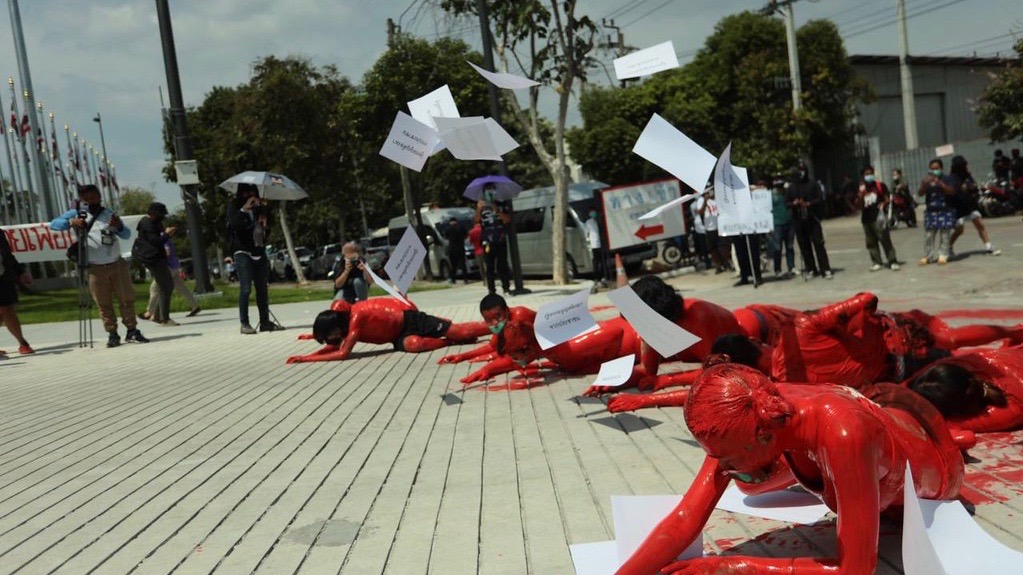Activists in Thailand are renewing the demand to do away with the country’s controversial and stringent lèse-majesté laws. On Wednesday, October 27, activists approached a parliamentary committee to petition for the repeal of Section 112 of Thailand’s Criminal Code that deals with lèse-majesté.
The petition was submitted by the Committee Campaigning for a People’s Constitution (CCPC) to members of the House Committee on Legal Affairs, Justice, and Human Rights. Dozens of activists gathered outside the parliamentary building in Bangkok and held a demonstration with posters reading “Prayut [Prime Minister Prayut Chan-o-cha] is a danger to the nation, but 112 could be a danger to you,” and “The next person accused of 112 could be you.”
Activists from pro-democracy group Thalufa, bathed in red paint representing police violence and political repression, also participated in the demonstration. The petition was received by opposition legislators Chavalit Witchayasut of the Pheu Thai Party and Rangsiman Rome, elected as a member of the Future Forward Party.
According to Prachatai, the CCPC argued that “the text of the law is unclear and can be widely interpreted, while it is strictly enforced.” The CCPC has also requested the House Committee to summon officers who are involved in the recent spate of charges against activists.
Political activist Somyot Pruksakasemsuk, who was previously in prison for seven years over royal defamation, also spoke at the demonstration and said that Section 112 has been used to restrict freedom of expression, which is a fundamental freedom in a democracy.
The petition is the latest in the push by different groups to revive the original demand of Thailand’s pro-democracy movement. Earlier this week, a mass signature campaign organized by Citizens for the Abolition of 112 was announced and is scheduled to be launched on October 31.
On Sunday and Monday, dozens of activists representing various pro-democracy groups held demonstrations in different parts of the Thai capital Bangkok. Demonstrations were also held outside the premises of the Supreme Court on Sunday
On Monday, marking 70 days of bail denials by courts to political prisoners detained under Section 112, activists held a demonstration outside the Criminal Court complex in Bangkok.
The People’s Party reiterated the long standing demands of Thailand’s pro-democracy movement, which include reform or abolishing of Section 112 and reforms in the defamation laws to do away with prison sentences under such cases.
Insulting, defaming or threatening the monarch or any member of the royal family is a non-bailable offense in Thailand. Under Section 112, these carry a prison sentence of three to 15 years, the harshest among all monarchies in the world.
Pro-military governments have often in the past used the law against those advocating for reforms and transparency in the monarchy and its finances. The current military-supported government of Prayut Chan-o-cha has only escalated this political repression in the name of lèse-majesté.
Opposition lawmaker Rangsiman Rome, who received the petition, noted that petitions and complaints against the use of Section 112 are not new and issues with the judicial process have been pointed out before.
According to Thai Lawyers for Human Rights, since November 2020, 154 people have been charged under Section 112. Almost all of these activists had participated in the various demonstrations that swept Thailand, especially Bangkok, since August last year. The issue thus extends to the larger problem of judicial processes being used to target activists in the country.
TLHR has documented close to 800 ongoing cases of prosecution against protesters, with charges slapped against 1,458 people. Of those facing various charges, ranging from sedition and lèse-majesté to violation of pandemic-related emergency decree, 223 are minors under the age of 18. Several activists like Parit “Penguin” Chirawak are implicated in multiple charges concerning national security for organizing protests and demonstrations.
While authorities have tried to justify the cases against protesters by claiming that they tried to threaten the royal family or undermined the monarchy as an institution, the demand for monarchy abolition is yet to be raised by any of the major groups involved in the protests.
Most activists have demanded protection of freedom of expression and more transparency in the finances of the royal family led by King Vajiralongkorn, who owns up to USD 60 billion in wealth according to certain estimates and annually receive close to a billion dollars in financing from the government.
Moreover, several activists facing lèse-majesté cases have been charged for harmless incidents, such as a mock fashion show with attire similar to the royal family, hanging banners outside their residence, or speech demanding transparency in royal finances.





